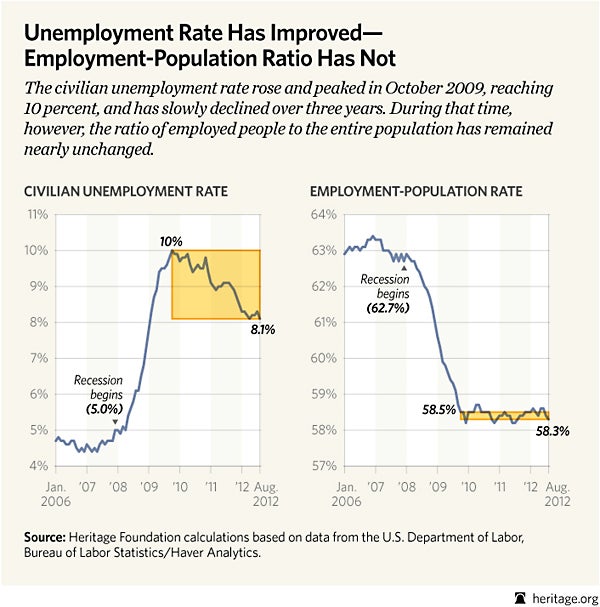Morning Bell: Obama’s Dismal Jobs Record
Amy Payne /
The unemployment rate is now 8.1 percent, marking 43 months straight that it has stayed at 8 percent or above. At least 12.5 million Americans are out of work. Yet President Obama has been trying to convince people that he’s a job-creating President.
Have 4.5 million new jobs been created under President Obama, as several speakers in Charlotte have claimed this week?
A fact check shows that under President Obama, the U.S. economy has created a net 415,000 private-sector jobs—less than 0.2 percent of the 155 million-member American workforce. But even that statistic does not tell the full story, since the workforce itself has shrunk dramatically in size since Obama took office. Labor force participation is at 63.5 percent, its lowest level since 1981. In other words, a large chunk of Americans have simply given up looking for work. A significant number are collecting disability insurance instead, according to new research from Heritage’s James Sherk.
In fact, the share of the adult population with jobs has remained flat for the past two years. The only reason the unemployment rate edged down slightly in August was that fewer people looked for work and thus no longer count as unemployed. The percentage of people participating in the labor force dropped by 0.2 percent—the same amount the unemployment rate dropped. As Sherk has explained, we are in the slowest recovery in 70 years, and job creation has not recovered since the recession began in 2007. (continues below chart)
The economy is treading water and struggling for breath. This is exactly the wrong time to raise taxes. Yet with Taxmageddon bearing down on the economy, that is exactly what some members of Congress have proposed. This would be a terrible mistake.
The Congressional Budget Office (CBO) reported recently that if Congress and the President do not act before the end of the year to prevent Taxmageddon, America will have another recession on its hands in the coming year. With 12.5 million Americans already out of work, imagine a fresh recession.
Taxmageddon, scheduled to hit on January 1, 2013, will be the largest tax increase in American history. It’s a one-year, nearly $500 billion tax hike that will hit businesses, families, young people—its impact will be devastating. Heritage has calculated that a middle-class family of four will see their taxes go up by more than $4,100 just next year. [See how Taxmageddon will impact you.]
If Congress and the President do not prevent Taxmageddon, the CBO said sluggish economic growth won’t be our problem next year. Instead, the U.S. economy will actually shrink. It will shrink by 0.5 percent, and the unemployment rate will spike to 9.1 percent.
That will mean even more jobs lost. Heritage’s J.D. Foster explains:
Forget percentages—what does this mean in actual jobs lost if President Obama and Congress fail to act? It means roughly 1.6 million more Americans will be out of work—on top of the 12.8 million who already want to work but can’t find jobs.
A shrinking economy. More than a million jobs out the window. The country cannot afford this. The time for political speeches is over. It’s time for Congress and the President to do the one thing that matters most before the end of the year: preventing an economic catastrophe from happening on New Year’s Day.
Quick Hits:
- A new report from the Institute of Medicine says the U.S. health care system wastes $750 billion per year.
- Israeli Prime Minister Benjamin Netanyahu apparently got into a “sharp confrontation” with the U.S. Ambassador to Israel in a recent meeting over the Obama Administration’s Iran policy.
- In The Washington Post today, Heritage’s Robert Rector explains how President Obama has gutted welfare reform.
- Ayn Rand’s ideas are coming again to theaters this fall. This week, the producers of Atlas Shrugged Part II released the movie’s official trailer.
- This week, the U.S. national debt passed $16 trillion. What does this mean for the country? Join Heritage for an online chat today at noon ET and bring your questions.

